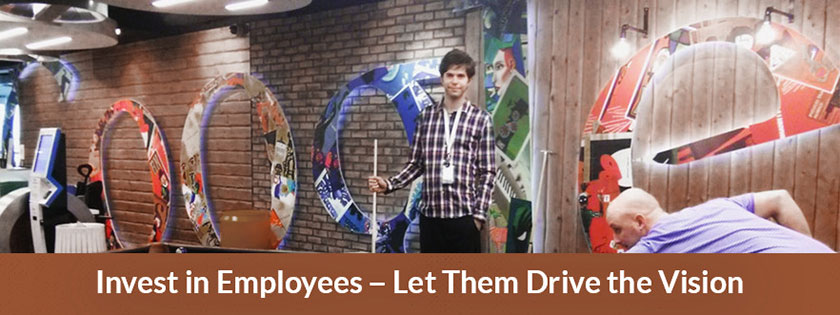Become an insider!
Get our latest payroll and small business articles sent straight to your inbox.
The difference between a small business or startup and a successful and profitable company typically boils down to time and experience. But, there are certain factors that play a big part in how those companies grew to be successful — things like timing, having the right people, focus, and intensely hard work.
Remember that every major company was a startup at some point. Every Fortune 500 firm started as an idea that had to be built and guided by an entrepreneur and team of pioneers.
Even though statistics, researchers, and the media tell you that the odds are stacked against you and the probability of failing is high, there are plenty of opportunities to succeed. One of the best ways to steel yourself against the hard times and tough decisions is to look at successful entrepreneurs and CEOs who have already blazed those trails.
They’ve learned the hard lessons and are willing to share knowledge that you can apply to fuel sustainable growth. Here are some insights from a few of them who learned how to overcome the odds and successfully scale their businesses.
1. Keep processes as simple as possible.

For Five Acre Farms CEO, Dan Horn (4th from left), simplicity is the best way to grow and keep customers happy.
Successful business leaders are often so because they learn how to be good at simplifying things. They take the complex and make it less complex. This philosophy and approach to business is used in everything from product launches to developing workflows.
Part of the success of Apple under the watch of Steve Jobs was born from his ability to remove things that were overly complicated. He was notorious for canceling projects he viewed as extraneous.
Complexity sucks time. It requires more meetings, more explanation, more refined communication with the customer, more people in the workflow, and more cogs in the machine. Complexity slows businesses down and inhibits growth.
“As businesses grow and scale, the key dynamic that slows progress and, at the extreme, impairs a business, is the creeping effect of complexity,” says Arnab Mishra, President and COO of Transera. “Complexity rears its head as products evolve, organizations grow, and business strategies change. CEOs of growing companies need to be aware of the impacts of growing complexity, and take actions to continuously simplify the operations and strategy of the organization.”
“CEOs that are most effective in reducing complexity tend to have a clear and well-communicated vision of the business’ goals, an ability to lead employees towards that vision, and a willingness to change course when it becomes clear that certain strategies are not providing the required results.”
Keeping your processes simple makes it easy to stay engaged with the people who are the greatest component of your growth and success — your customers.
“Simplicity is really important,” says Dan Horan, CEO of Five Acre Farms. “It’s got to be simple, and sometimes to make something simple you have to really, really study everything about it. It might turn out to be complex, but you have to present it simply, particularly when it comes to people: when people buy something, they don’t want a lecture.”
2. Focus on delighting your customers.

Five Guys CEO Jerry Murrell says their customers are their best salespeople.
While customer acquisition is important in any business, you need to focus on the customers you have. Customer perceptions can make or break a business. If you deliver quality experiences, products, and service, and you make every effort to delight your customers, then they’ll sing your praises.
In a study from Nielsen on advertising, media, and peer recommendations, it was discovered that 92% of consumers around the world trust earned media, such as personal recommendations and consumer opinions from friends and family, above all other forms of advertising.
When you delight your customers, and they share that delight, your business will grow. That’s the mindset of Five Guys and they’ve held that position since their launch in 1986.
“We figure our best salesman is our customer,” says Jerry Murrell, CEO of Five Guys. “Treat that person right, he’ll walk out the door and sell for you. From the beginning, I wanted people to know that we put all our money into the food. That’s why the decor is so simple – red and white tiles. We don’t spend our money on decor. Or on guys in chicken suits. But we’ll go overboard on food.”
Delighting your customers doesn’t have to be a time-intensive operation and you don’t have to completely restructure your business model. You just need to operate in a way that anticipates their needs and stays with them beyond the point where they make that first purchase.

Ritz Carlton is famous for its world-class customer service at its resorts and hotels.
Even the simple act of empowering employees to be proactive and delight customers can go a long way.
Carmine Gallo, a communications coach for some of the most well-known brands in the world, shared a story about the level of customer care at Ritz Carlton resorts and hotels:
“Ritz-Carlton employees are trained to anticipate the unexpressed wishes of their guests. During one stay the receptionist called me and said, ‘We see that you are scheduled to leave very early tomorrow. Can we leave a pot of fresh, hot coffee outside your door?’”
Offer: Wagepoint is still FREE for 30 days – with no obligation. Get your trial now.
3. Invest in employees — Let them drive the vision.

Google provides some pretty amazing perks to its employees.
You may have heard about a lot of the perks that come from working at tech-giant Google, like extended paid parental leave, bonus payments for new parents, free food, college tuition reimbursement, paid leave for volunteering, unlimited sick days, and more.
But Google is far from the only company investing in its employees.
- Zappos pays 100% of the premiums for employee healthcare and offers free generic prescriptions as well as nap pods, on-site fitness centers, and an employee library.
- Build-a-Bear Workshop provides concierge services and customized workweeks based on employee lifestyle.
- Mayo Clinic reimburses for adoption expenses and has an on-site medical care facility.
- The Container Store offers fully-paid sabbaticals and offers pet insurance for employees. Domestic partners and common-law spouses are also covered by company benefits.
Companies invest a great deal of money in their employees for good reason — it helps them grow by retaining and attracting top talent, who are more loyal, have a more fulfilling work/life balance, and as a result, work harder.
When employees feel valued, they’ll passionately share your vision and dig deep to help your business thrive.

Guidance Aviation CEO John Stonecipher chalks up his success to the leadership skills of his entire team.
“Surround yourself with the best people you can and give them an opportunity to do what they love to do best,” says John Stonecipher, CEO of Guidance Aviation. “Each one of my staff and faculty are leaders themselves. I cannot succeed without them.”
When people are financially invested, they’re looking for a return on that investment. When your employees feel valued, they become emotionally invested and they want to contribute.
Peter Collins, CEO of A2B Tracking, talks about a time when his company was going through a significant growth phase. “We didn’t have stated company values at the time and it was hurting us, especially as we hired on new employees.”
“To make the conversation meaningful, I invited one or two employees from every division of A2B. We wanted to make sure we included everyone. Soon we had left brainers working with right-brainers during a brainstorming session and they provided great results! We ended up with five core values that are short and simple to understand.”
“Today, we recognize team members quarterly for their achievement of these standards. The values adorn the hallways, live in our proposals and on our website. They are the star by which we navigate.”
Investment also goes beyond perks and benefits. Meet with key people throughout your company. Talk to employees and find out what resources they feel are needed to work better and more efficiently. Invest in the resources that will help them today and scale with operations as your business grows.
4. Stay tuned in to your business.

Bar Rescue host Jon Taffer learned early on the importance of seeing his business from every angle.
As you grow your business, one of your goals should be hiring smart, talented people to handle various tasks. As a business owner, you can’t be involved in everything, so it’s important to delegate and let other, better-suited people handle the work.
But that doesn’t mean you should step back and tune out. Just because it’s being handled, doesn’t mean you’re not involved.
In an interview with Business Insider, host of the TV show Bar Rescue, Jon Taffer, spoke about a hard lesson he learned in his early years in business:
“Years ago when I was very young,” he recalls, “a VP of Hyatt looked at me and said, ‘You look, but you don’t see.’ I learned to look not just at the big picture, but also at every place setting, light fixture, and customer exchange. See every crack, every detail. I learned to really see and not just look at my business.”
When you stay tuned into your business and are aware of your surroundings, you’ll better anticipate the need for change and adjustment and be able to quickly pivot and adapt when the time comes.
Growth isn’t a straight line to the top — it’s more like scaling a rock wall. It’s a slow, steady, strategic climb, and you need to be aware of every handhold, foothold, and loose stone in order to make it to the summit.
5. There are no shortcuts in scaling.

Shark Tank host Mark Cuban refuses to take shortcuts in business or in life.
As your business begins to grow, you may be tempted to make cuts — and take shortcuts — in order to reach your next goal faster. There’s no more surefire way to cripple your business than to cut corners and try to take the easy path to success.
Every action you take now has repercussions later.
In his book Drive: The Surprising Truth About What Motivates Us, entrepreneur and career analyst Dan Pink puts shortcuts into perspective, explaining how focusing too heavily on your end goal of scaling your business can impact your business.
“The problem with making an extrinsic reward the only destination that matters is that some people will choose the quickest route there, even if it means taking the low road.Indeed, most of the scandals and misbehavior that have seemed endemic to modern life involve shortcuts.”
When you take shortcuts, you make compromises. You compromise your ethics, your values, and the integrity of your business — often at the expense of the customer and your employees.
Dallas Mavericks owner and Shark Tank host Mark Cuban remembers the best advice about success in business that he ever received:
“Do the work,” says Cuban. “Out-work. Out-think. Out-sell your expectations. There are no shortcuts. My dad told me that when I was in high school. My dad did upholstery on cars, and he was always very encouraging, but also realistic.”
6. It’s okay to ask for help.

Apple founder Steve Jobs lived by taking risks and asking for help when it was needed.
Too often, entrepreneurs view asking for help as a sign of weakness. They think that asking for help means they’re somehow exposing their vulnerable underbelly to predators, waiting patiently in the shadows for the chance to to destroy them.
The most successful entrepreneurs didn’t become effective leaders because they were good at bossing people around or because they had all of the answers all of the time. The greatest leaders achieved success because they had a vision. They inspired people to help them get there, and they knew to ask for help in order to turn their visions into something real.
In 1994, just a couple of years after re-joining Apple, Steve Jobs spoke with the Santa Clara Valley Historical Association in a video about the necessity of asking for help:
“Now, I’ve actually always found something to be very true, which is that most people don’t get those experiences because they never ask.I’ve never found anybody who didn’t want to help me when I’ve asked them for help.”
In the video, Jobs told a story about a phone call he made to the co-founder of Hewlett-Packard. At just 12 years old, Jobs asked for spare parts to build a frequency counter. Bill Hewlett agreed and also offered Jobs a summer job at his company assembling the devices.
“I’ve never found anyone who’s said no or hung up the phone when I called – I just asked. And when people ask me, I try to be as responsive, to pay that debt of gratitude back.
“Most people never pick up the phone and call, most people never ask. And that’s what separates, sometimes, the people that do things from the people that just dream about them. You gotta act. And you’ve gotta be willing to fail, you gotta be ready to crash and burn, with people on the phone, with starting a company, with whatever. If you’re afraid of failing, you won’t get very far.”
You’d be amazed at how many people within your network will stand up, coming running, and give their all to help you succeed. It’s okay if you don’t know how to do something on your own. As an entrepreneur, no one expects you to have all the answers and all the skills all of the time.
But if you leverage the knowledge and skills of the people around you to grow your business — employees, friends, family, and colleagues — you can be unstoppable.
7. Time is a precious commodity.

Hello Design founder David Lai knows the importance of making time for little things.
The best time start growing your company was yesterday. If that didn’t happen, then today will do. Your time should be treated like a precious resource. If you’re not treating it that way, then you won’t make sound investments with it.
Being able to scale your business and meet growth goals requires better time management and prioritizing each day so your time is used effectively.
David Lai is the founder of Hello Design. His creative agency has helped build and execute digital strategies for companies like Sony, Nike, and Toyota. In his youth, his father told him, “We only have 24 hours a day. It’s what we choose to do with that time that defines us.”
He has grown his business based on those teachings.
“Part of being successful means you have to decide what not to do,” says Lai. “There are so many things I want to do, and I really have a mentality of do it right or not at all. It’s definitely not for everyone, but I feel that if you do something halfway, it’s a waste of time because you’ll probably have to do it again.”
“My way of working helps me look at the big picture before I begin each day without getting sucked into the details too soon. Having a short-term goal of accomplishing tasks by end of day keeps me moving by breaking down longer-term goals. The little things add up quickly, and realizing that even if I set my goal high, it’s not the end of the world if I can’t get everything done in one day – there’s always tomorrow.”
8. Learn to say no.

SumAll CEO Dan Atkinson uses “no” to help him focus on the best ideas and strategies.
Business owners spend a lot of time chasing growth. So when opportunities are presented to us in a compelling way with the potential for great success, it can be hard to turn them down.
Along the same lines, you may be inclined to experiment with ideas thrown your way in an effort to see what sticks and contributes to growth. It’s important to remember that not every idea that crosses the conference room table is a great one.
But, sometimes less-favorable ideas can lead to better ones when you spend time analyzing them during ideation.
“One thing that I’ve slowly come to realize is that focus is so critically important,” says Dane Atkinson, CEO of social analytics company SumAll. “Saying ‘no’ to great ideas is necessary to get to the brilliant ones. At every step of the way, you have to cut towards one path. It’s such a hard thing to do as an entrepreneur because you don’t really have the confidence in where you’re going yourself.”
At the end of the day, you’ve only got so many resources. If you don’t learn to say no, you’ll be wrapped up in trying to deploy too many things.
At best, everything moves far too slowly because you’re overextended. Too few resources spread across too many projects isn’t scalable.
At worst, nothing gets executed and growth comes to a grinding halt.
9. Grow by the data — Avoid spending on speculation.

ScribbleLive CEO Vincent Mifsud uses data to drive strategy.
The key to sustainable growth is in the hard data. This can come from a variety of sources and often revolves around your customers and prospects, including:
- How customers move through your sales funnel.
- How long it takes to convert.
- How long they remain a customer.
- What causes them to leave/stay.
- How they engage with you.
- What attracts their attention.
- What their pain points are.
- What the biggest complaints or issues with your product/service are.
- What they love about you.
While it’s important to spend money on things that help with operations and fulfillment to ensure your company can handle growth, you should also spend money on data-driven marketing. This includes marketing to acquire new customers, as well marketing to engage existing ones.
“There are a lot of startups that burn through cash excessively,” says Vincent Mifsud, CEO of ScribbleLive. “Yes, you need money to fuel growth, but if your primary strategy is pure spending, you’re setting yourself up to fail. Once your team is used to a culture of spending, it’s extremely hard to roll back and put accountability in place.”
“Learn from the tech companies that went bankrupt in the late 90s when the capital markets dried up. Be laser-focused with your investments instead, especially when it comes to marketing — place bets on content marketing, not ads, and use the proper tools to ensure you’re making data-driven decisions.”
When you pay attention to the data, you’ll be able to address major issues, like the causes of customer churn or leaks in your sales funnel that are limiting acquisition. Your site analytics, survey responses, social insights, and customer data can reveal a wealth of opportunities where taking action will have a significant impact on the growth and scalability of your organization.
What has been a critical part of the growth and success of your business? What advice would you share with other entrepreneurs? Share your thoughts with us in the comments below.
Image Sources: Five Acre Farms, Inc, Forbes, Google, Entrepreneur, Business Insider, Business Insider, Huffington Post, Dwell, SumAll, ProfitGuide
Disclaimer: The advice we share on our blog is intended to be informational. It does not replace the expertise of accredited business professionals.












